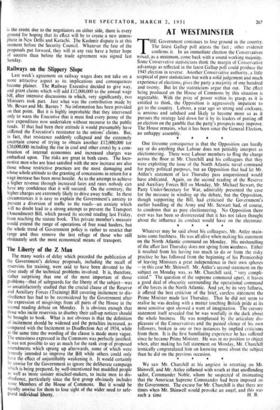Railways on the Slippery Slope
Last week's agreement on railway wages does not take on a more attractive aspect as its implications and consequences become plainer. The Railway Executive decided to give way. and grant claims which will add £12,000,000 to the annual wage bill, after intensive discussions in which, very significantly, two Ministers took part. Just what was the contribution made by Mr. Bevan and Mr. Barnes ? No information has been provided on that point. But it is highly improbable that they intervened only to warn the Executive that it must find every penny of the new expenditure now undertaken without recourse to the public funds. If that had been their attitude it would presumably have stiffened the Executive's resistance to the unions' claims. But, in fact, that resistance suddenly collapsed and the extremely uncertain course of trying to obtain another £12,000,000 (or 00,000.000 including the rise in coal and other costs) by a com- bination of internal economies and increased charges was embarked upon. The risks are great in both cases. The loco- motive men who are least satisfied with the new increase are also those whose restrictive practices are the most damaging and whose whole attitude to the granting of concessions in return for a wage increase has been most hostile. As to the attempt to achieve a higher revenue through increased fares and rates nobody can have any confidence that it will succeed. On the contrary, the higher charges are extremely likely to drive away traffic. In these circumstances it is easy to explain the Government's anxiety to prevent a diversion of traffic to the roads—an anxiety which will no doubt lead to a strong attempt to prevent the Transport (Amendment) Bill, which passed its second reading last Friday, from reaching the statute book. This private member's measure would extend the range of operations of free road haulers, but the whole trend of Government policy is rather to restrict that range and thus remove the last refuge of those who still obstinately seek the most economical means of transport.


































 Previous page
Previous page